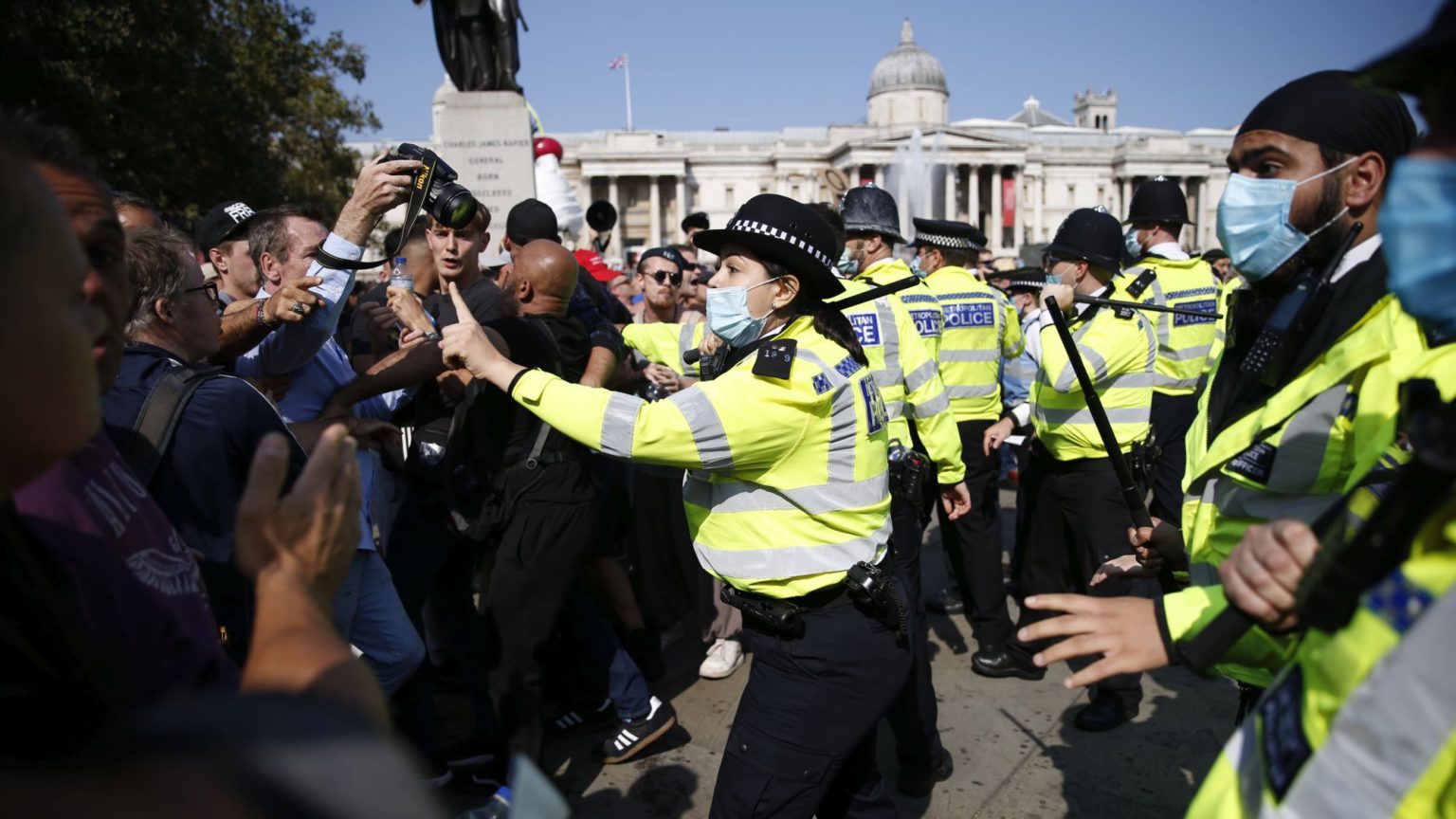Our political police won’t allow protests they disagree with
Police are clamping down on anti-lockdown protests, while woke causes are largely given free rein.

Want to read spiked ad-free? Become a spiked supporter.
‘Which side are you on?’, sang Billy Bragg during the 1984-85 Miners’ Strike. The political context may be entirely different, but his question for the police is once again pressing today.
For Bragg, miners were being denied their right to protest against government policies which were threatening their livelihoods. Today, police are denying the public that same right – but selectively. Anti-lockdown protesters chanted ‘Choose your side’ at officers in London over the weekend in an unwitting throwback to days past.
We are all familiar with the common and much-derided scene of police officers kneeling in solidarity with Black Lives Matter protesters.
The statue of Winston Churchill in Parliament Square and the Cenotaph were boarded up to protect them from BLM demos, presumably because the police were not prepared to defend the statues themselves.
Indeed, in Bristol, police stood by while activists tore down a statue of the slave-owner Edward Colston. Local police chief Andy Bennett was supportive, even saying, ‘Bristol should be proud of itself’. When thousands of BLM protesters converged on London over the summer, the Metropolitan Police left them largely unmolested.
Contrast this with what happened when anti-lockdown protesters met in London at the end of August. One of the principal organisers of the event, Piers Corbyn, was slapped with an unbelievable £10,000 fine. Or consider the events of the weekend just gone, when police told attendees of another anti-lockdown event to disperse, with some saying coppers stormed the gathering.
The Health Protection (Coronavirus) Regulations 2020 empower the authorities to give £10,000 fines to those breaching rules on organising gatherings. To be fair, this specific legislation came about after the main wave of BLM protests had already passed. However, police were surely not held back from acting against BLM by a weak legal footing. They had spent the previous months busily emptying beaches and parks of sunbathers and setting up roadblocks to control ordinary people’s travel arrangements. Police overreach was so extreme that at times they were arresting people for crimes that don’t even exist. But the police decided against treating BLM in the same way it did the ‘Covidiots’.
New rules have now been introduced allowing exemptions to the ban on gathering. Political protests are allowed to exceed the recently imposed ‘Rule of Six’ on group sizes. But before the rules changed, one Extinction Rebellion protest was reportedly given permission in advance by police (provided certain conditions were met). XR’s summer gatherings included the blockading of printing presses, preventing the distribution of numerous national newspapers. XR’s theatrics caused far more disruption than Piers Corbyn and his colleagues.
At the weekend, women’s rights campaigner Posie Parker was arrested in Leeds after police informed her that the protest she organised did not count as ‘political’. As a result, it was not covered by the new exemption to Covid rules for protests. It remains unclear why the ideas she sought to raise – identifying the conflict between transgender politics and women’s rights – are apparently apolitical, and unworthy of protest in the view of the state.
This is not the first example of the police taking sides on trans issues. A new report by Fair Cop reveals Wiltshire police spent over £3,000 on ‘rainbow branding’ in support of Pride from 2019 to 2020, while Avon and Somerset police spent nearly £900 on rainbows as well as an annual fee of £2,500 to Stonewall, an LGBT lobby group. So it is not surprising that police refused to recognise Parker’s protests.
It is clear that British police are no longer impartial. Much like the BBC, the British Library or our universities, the police force is yet another public institution which is meant to be objective, but has clearly visible political biases. The police have shown this year that they will not apply the law equally to all. Instead, they will treat some more harshly than others for the same absurd non-offences.
One of the fundamental principles underlying any healthy democracy is the idea of equality before the law. Legal systems fail when they treat individuals differently because of the groups from which they originate, whether they be ethnic, religious or political. They fail morally, but also practically, because they encourage disrespect for the law. Why take the law seriously if you know it will not treat you fairly?
Of course, the answer to this imbalance is not to give fines to all protesters. We should instead be standing up for free speech and free assembly. It is outrageous that anyone can be fined £10,000 for organising a protest, and that should be just as true for a BLM activist as for an anti-lockdown protester. We cannot leave it to the police to decide which causes are worthy of protest.
Paddy Hannam is a spiked intern.
Picture by: Getty.
Who funds spiked? You do
We are funded by you. And in this era of cancel culture and advertiser boycotts, we rely on your donations more than ever. Seventy per cent of our revenue comes from our readers’ donations – the vast majority giving just £5 per month. If you make a regular donation – of £5 a month or £50 a year – you can become a and enjoy:
–Ad-free reading
–Exclusive events
–Access to our comments section
It’s the best way to keep spiked going – and growing. Thank you!









Comments
Want to join the conversation?
Only spiked supporters and patrons, who donate regularly to us, can comment on our articles.